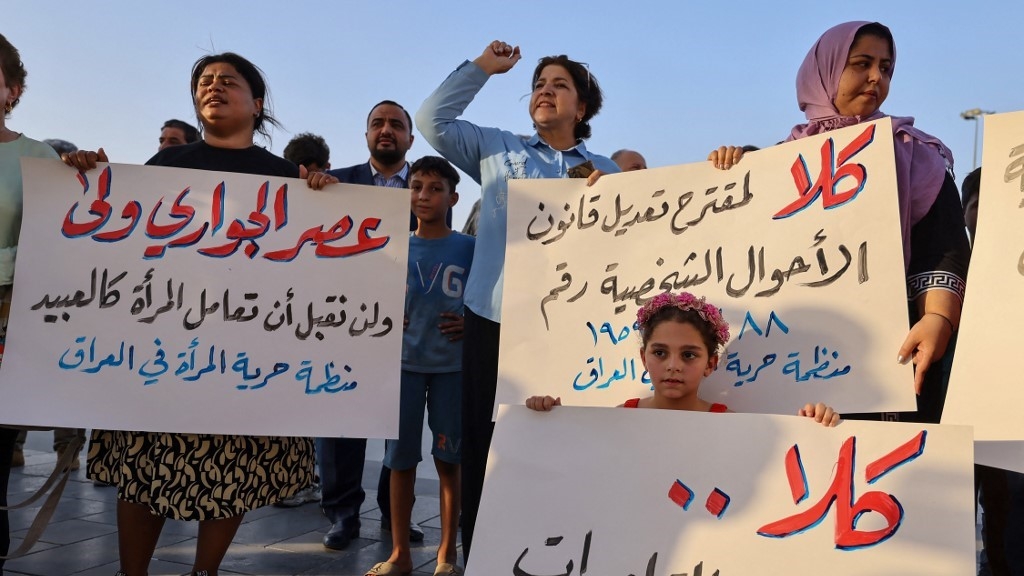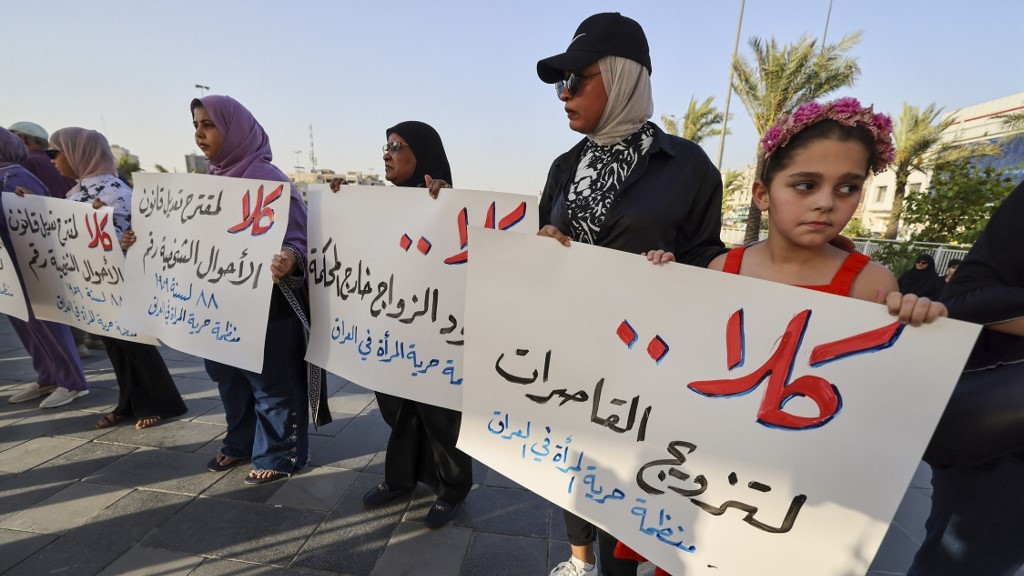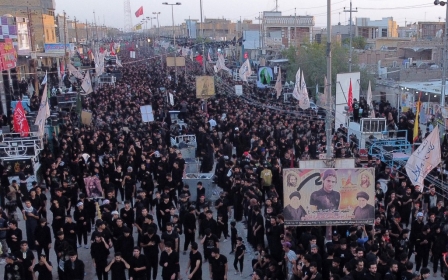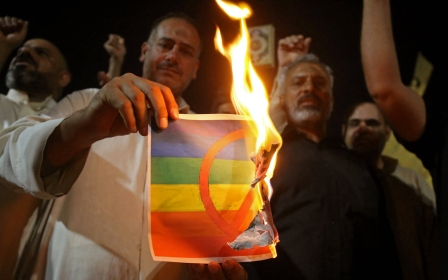Women in Iraq condemn 'sectarian' draft bill that could legitimise child marriage

Women and children's rights campaigners in Iraq have pushed back at proposals that could enshrine sectarianism in family relationships, hand more power in family matters to clerics and open the door for marriage to be legalised for children as young as nine years old.
The amendments to Law No. 188, the Personal Status Law of 1959 have been heavily promoted by the Coordination Framework, a coalition of conservative Shia Islamist parties that form the largest bloc in parliament.
The first reading took place on Sunday, following a failed attempt on 24 July that was shelved after some parties objected.
It is only the latest attempt to bring forward amendments to the law, with previous ones being shelved after political outcry.
According to the draft bill, when concluding a marriage contract, a Muslim couple are required to choose either the Sunni or Shia sect.
New MEE newsletter: Jerusalem Dispatch
Sign up to get the latest insights and analysis on Israel-Palestine, alongside Turkey Unpacked and other MEE newsletters
They can then choose that sect to represent them in "all matters of personal status" rather than the civil judiciary.
"When a dispute occurs between the spouses regarding the doctrine according to whose provisions the marriage contract was concluded, the contract is deemed to have been concluded in accordance with the husband’s doctrine unless evidence exists to the contrary," reads the draft, which was circulated by a number of Iraqi politicians on social media.
It would also allow figures from "the offices of the Shiite and Sunni endowments" to finalise marriages rather than the courts.
The draft requires Shia and Sunni endowments to submit a "code of legal rulings" to the parliament six months after ratifying the amendments, stipulating the Shia code would be based on "Jaafari jurisprudence".
Although the question of child marriage is not directly addressed in the amendments, previous versions of the bill have been more explicit and legal experts have warned that it could be allowed based on Jaafari jurisprudence.
Many Iraqi marriages are unregistered and conducted by religious figures, making them illegal under the current Iraqi Personal Status Law.
The proposed amendments could see those marriages - 22 percent of which, according to the UN, involve girls under 14 - legitimised by the state.
However, last week the Coordination Framework insisted the amendments would come before the parliament, saying they were constitutional and did "not contradict the constants of Sharia and the foundations of democracy".
Ra’ad al-Maliki, the MP who proposed the bill, has also hit back at claims the bill would lower the age minimum for marriage, calling them "lies fabricated by some out of hatred for applying the provisions of God’s law to those who want them".
'No to the marriage of minors'
Women's rights organisations have publicly demonstrated against the bill.
On 28 July, a group of activists - including campaigners from the Organization of Women's Freedom in Iraq (OWFI) - gathered in Baghdad's Tahrir Square in opposition to the bill.
They held placards reading "the era of female slaves is over" and "No to the marriage of minors".
Yanar Mohammed, president of OWFI, told Middle East Eye that the Coordination Framework were trying to push the "archaic" laws as a means of distracting from their own failings, including "huge corruption".
"Their most efficient tool for this distraction is to terrorise Iraqi women and civil society with a legislation that strips away all the rights that Iraqi women gained in modern times, and force archaic Islamic sharia on them that regards women as bodies for pleasure and breeding, and not as human being[s] with human rights," she said.
She added that OWFI and others were building a "coalition" to try and prevent the bill from passing through the parliament and defend the current law.
A number of Iraqi female lawmakers, including members from different factions, have meanwhile formed a coalition in opposition to the amendments of the Personal Status Law.
"The group wants to make it clear to everyone that the rejection is not based on emotions or external motives, but on legal, religious, professional, and social considerations and people who are concerned about protecting the order of the Iraqi family," Iraqi MP Noor Nafea al-Julihawi was quoted as saying by the Kurdistan24 news site.
'Profoundly negative impact'
The 1959 law was passed under the government of Abdul-Karim Qasim, a leftist nationalist who brought in a number of progressive reforms, including increased rights for women.
'[The proposed changes] would further entrench gender inequality and put vulnerable individuals at greater risk'
- Tamara Amir, CEO, Iraqi Women's Rights Platform
Since the 2003 US-led invasion of Iraq, however, rightwing political parties in the country have attempted to roll back these rights.
Previous versions of the bill have included rules preventing Muslim men from marrying non-Muslims, the legalisation of marital rape, and banning women from leaving the house without their husband's permission.
The latest version is considerably less explicit, but campaigners fear its passage will allow religious authorities to introduce the rules through their establishment of the Personal Status code.
"These proposed changes to the Personal Status law would have a profoundly negative impact on the rights and wellbeing of women and children in Iraq," said Tamara Amir, CEO of the Iraqi Women's Rights Platform.
She told MEE that unlike previous attempts at passing the reforms, she believed that the current government - led by Coordination Framework member Mohammed Shia al-Sudani - would manage to get it passed, despite Iraqi society being "divided" on the issue.
"They would further entrench gender inequality and put vulnerable individuals at greater risk," she said.
"We urge policymakers to reject these proposals and instead focus on strengthening protections for women and children."
Middle East Eye delivers independent and unrivalled coverage and analysis of the Middle East, North Africa and beyond. To learn more about republishing this content and the associated fees, please fill out this form. More about MEE can be found here.





